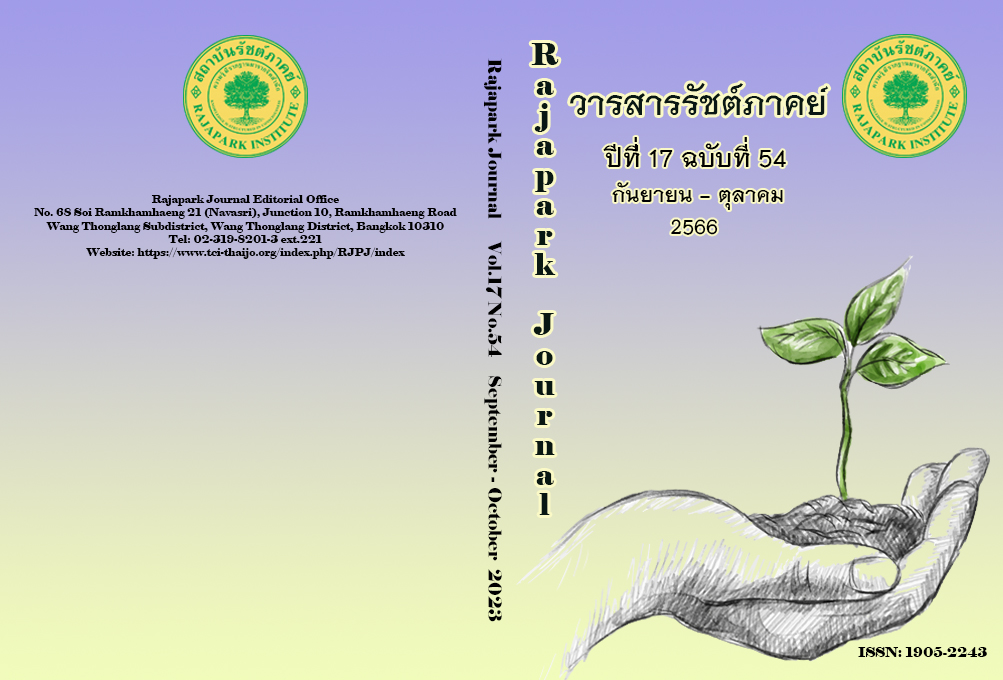A Study of Social Networks of the Chiang Mai Anti-Thaksin Shinawatra Movement
Main Article Content
Abstract
The purpose of this academic article is to present a study of the Chiang Mai anti-Thaksin Shinawatra movement, using the concept of social network analysis as the main concept to understand the formation and dynamics of social movements in Chiang Mai between 2005 and 2014. The objective is to study the network and the framing process of the Chiang Mai anti-Thaksin movement. A methodological approach based on qualitative research was used for this research. Data were gathered by conducting in-depth interviews with two groups: 12 anti-Thaksin movement leaders and their networks, and 12 anti-Thaksin movement participants. The analysis found that a network previously existing in Chiang Mai is the foundation of the anti-Thaksin movement, which is a political movement and civil society that has fought for rights and democracy since the October Revolution on October 14, 1973. The most significant network groups that have played a pivotal role in the anti-Thaksin movement are the NGOs, the former October Students Network, and the middle-class network in Chiang Mai. Consequently, the Chiang Mai anti-Thaksin movement has become a significant ally of the powerful anti-Thaksin movement and has exerted a lasting impact on Thai politics to date. The research findings indicate that the Chiang Mai anti-Thaksin movement is rooted in the legacy of the people's movement that previously supported the struggle for democracy, freedom, equality, and social justice. However, over time, the movement has transformed into one that embraces anti-democratic, nationalist, and conservative ideologies. This evolution sets the anti-Thaksin movement in Chiang Mai apart from the anti-Thaksin movements observed in other regions, making it distinct and unique in its ideological orientation.
Article Details

This work is licensed under a Creative Commons Attribution-NonCommercial-NoDerivatives 4.0 International License.
Views and opinions appearing in the Journal it is the responsibility of the author of the article, and does not constitute the view and responsibility of the editorial team.
References
Archamas, N. (2015). Right-Wing Social Movements and Civic Terror Construction: A Case Study of the Enforcement of Le`se-Majeste` in Contemporary Thai Political Conflict. Journal of Social Sciences, Faculty of Social Sciences, Chiang Mai University, 27(1), 49–82. https://so04.tci-thaijo.org/index.php/jss/article/view/171491
Cheangsan, U. (2018). The People Politics. Matichon.
Chiengkul, W. (Ed.). (2003). Thai Student Movement from 1932 to October 14, 1973. Saitharn.
Diani, M. (2003). Introduction: Social Movements, Contentious Actions, and Social Networks: 'From Metaphor to Substance'. In Diani, M., & McAdam, D. (2003). Social Movements and Networks: Relational Approaches to Collective Action (Comparative politics). Oxford University.
Florence, P. (2003). Social Networks Matter. But how. In Diani, M., & McAdam, D. (2003). Social Movements and Networks: Relational Approaches to Collective Action (Comparative politics). Oxford University.
Haberkorn T. (2017). Revolution Interrupted: Farmers, Students, Law, and Violence in Northern Thailand. University of Wisconsin.
Jenkins, J. (1983). Resource Mobilization Theory and the Study of Social Movements. Annual Review of Sociology, 9(1), 527-553. doi:10.1146/annurev.so.09.080183.002523
Kraiphon, A. (2016). Framing the Mobilization of the Chula Network for Morality[Master’s thesis, Chulalongkorn University].
Manager Online. (2006, August 22). The Chiang Mai PAD Calls on the Police to Find a Leaker Attacking Them. https://mgronline.com/politics/detail/9490000106673
Na Talang, A. P. (2006). Origin of Northern Student Movement. In Memorial at the Funeral Ceremony of Mr. Kraiwut Sirinupong. essay, n.p.
Nethipo, V. (2000). Influences in Thai Local Politics: A Case Study of Chiang Mai City. Journal of Social Sciences, 31(2), 168-235.
Oberscall, A. (1973). Social Conflict and Social Movements. Prentice-Hall.
Phatharathananunth, S. (2006). Civil Society and Democratization: Social Movements in Northeast Thailand. Nordic Institute of Asian Studies.
Phulsukho, S. (2021, September 13). Interview Mr. Chatchawan Thongdeelert. Local Development Institute. https://www.ldi.or.th/2021/09/14/chatchawal/
Prachatai. (2006, February 19). 23 Northern Civil Society Organization prepares to protest Thaksin at Chiang Mai. https://prachatai.com/journal/2006/02/7385
Puensan, P. (2006). Kraiwut Sirinupong and the Struggle of the Northern People's Student Movement. In Memorial at the Funeral Ceremony of Mr. Kraiwut Sirinupong. essay, n.p.
Sritrakool, S. (2015). Concepts and Proposals for The Self–governing of Chiang Mai, Thailand[Master’s thesis, Thammasat University].
Thai News. (1973, October 16). Nak Suk Sa Tang Chiang Mai Wai A Lai. Thai News.
Thabchumpon, N. (2016). Contending Political Networks: A Study of the “Yellow Shirts” and “Red Shirts” in Thailand's Politics. Southeast Asian Studies, 5, 93-113.
Thongdeelert, C. (2022). (Issue brief). Record of the Northern NGOs from Memories. Northern Development Foundation.
Tonghnueid, S. (2021). (Issue brief). History of Northern Development Foundation. Northern Development Foundation.


